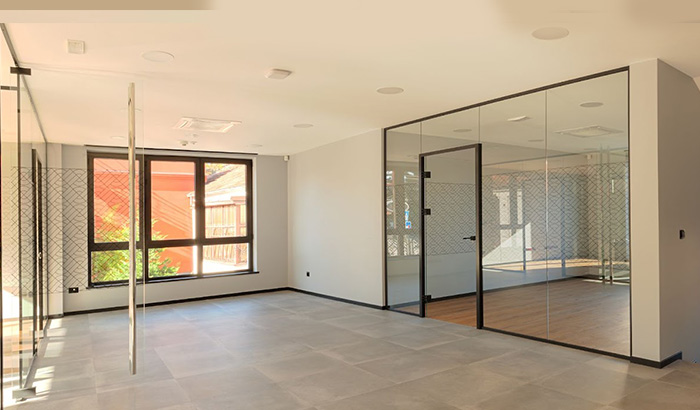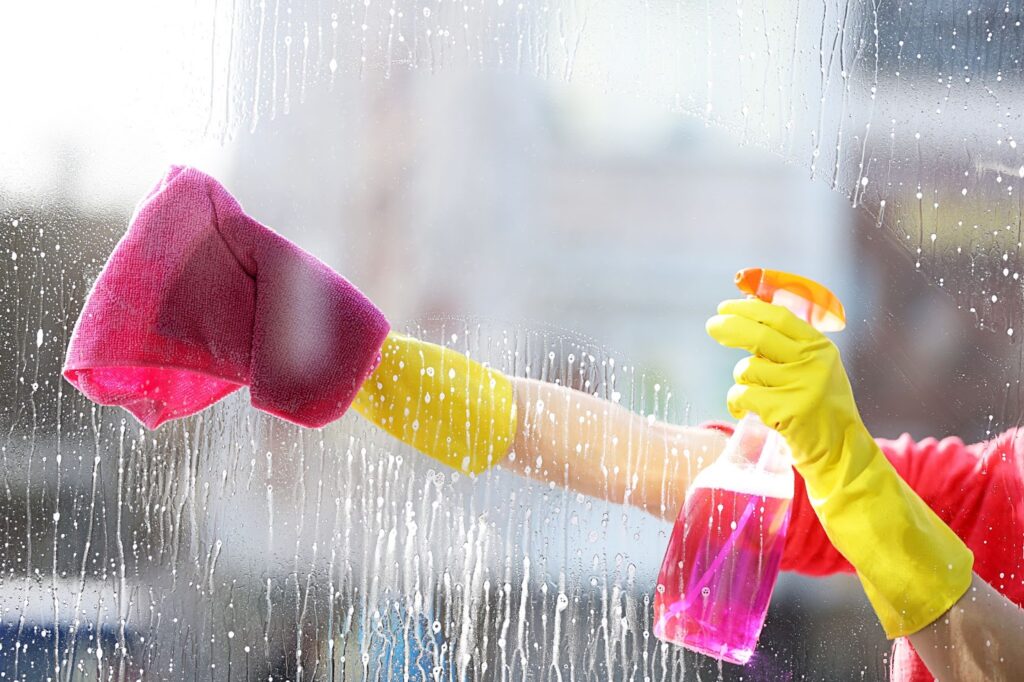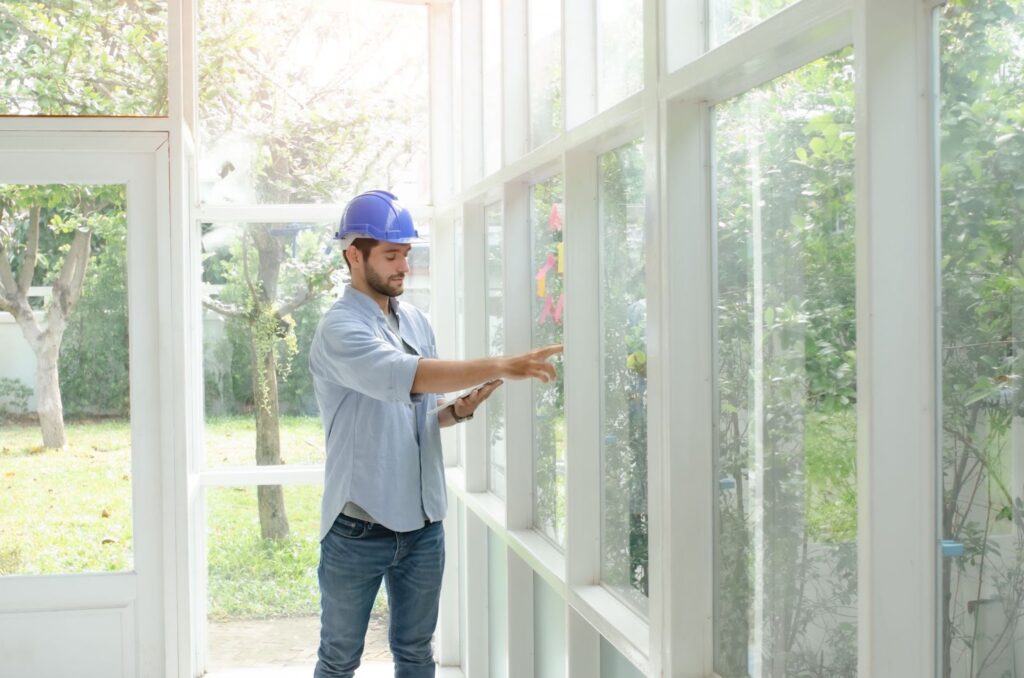
Large glass doors are a stunning feature in many homes and buildings, providing ample natural light and an unobstructed view of the outdoors.
However, these beautiful installations require regular glass maintenance to remain clean, functional, and aesthetically pleasing. This guide offers detailed advice on effectively taking care of your large glass doors, from routine cleaning to addressing common issues.
Maintaining these doors goes beyond keeping them clean; it also involves checking their structural integrity and alignment. Over time, the frames may shift, or the glass may settle differently, potentially causing issues with the doors’ operation.
Regularly inspecting the alignment and ensuring all fittings and fixtures are tight and correctly adjusted prevents problems before they become significant. This proactive approach not only helps in smooth operation but also extends the lifespan of the doors.
Another aspect to consider is the impact of the environment on your doors. In coastal areas, for instance, salt spray etches glass and corrodes metal components, necessitating more frequent cleaning and protective measures like applying a silicone sealant to repel water and prevent buildup.
Similarly, in urban settings, pollution and dust accumulate more quickly on glass surfaces, which means that your cleaning schedule might need to be adjusted to maintain clarity and visibility. Addressing these environmental factors plays a crucial role in the glass maintenance regime of your doors, ensuring that they continue to enhance your space without compromise.
Understanding the basics of glass door maintenance
Maintaining your doors isn’t merely about keeping them looking good. It also helps to extend their lifespan and ensures their smooth operation. Whether you have sliding glass doors, bi-fold doors, or French doors, each type has its own maintenance needs. Here, you’ll learn how to cater specifically to the needs of these large installations.
- Regular cleaning tips for sparkling glass doors
Maintaining the sparkle on your large glass doors is crucial for keeping your home looking bright and inviting. Over time, the clarity of your doors may diminish due to the accumulation of dust, fingerprints, and exposure to outdoor elements. Regular cleaning is key to preserving the appearance and integrity of the glass.
- Regular cleaning frequency is crucial
To prevent the buildup of grime and to maintain the shine of your glass doors, it’s important to clean them at least once a week. Regular cleaning keeps your doors looking tremendous and extends their lifespan by removing potentially corrosive substances that damage the glass over time.
- Choosing the right cleaner
While commercial glass cleaners are effective, you may also opt for a homemade solution that is both gentle and eco-friendly. A simple mixture of vinegar and water makes an excellent cleaning solution that leaves no streaks and is gentle on the glass. This solution is easy to prepare and is a cost-effective alternative to store-bought products.
- The right technique for cleaning glass doors
The technique you use to clean your doors can significantly affect the results. Always use a soft, lint-free cloth or a squeegee to avoid scratching the surface. Start cleaning from the top of the door and gently work your way down in an S-pattern.
This technique ensures that you cover the entire area without missing any spots. It also prevents drips and streaks from forming on the glass as you clean.

Following these steps ensures that your large glass doors remain a clear and shining feature in your home. Regular cleaning enhances the beauty of your doors and contributes to your space’s overall well-lit and welcoming atmosphere.
Taking care of your glass door is not only about aesthetics; it’s also about maintaining the quality and functionality of your home’s significant features. Consistent maintenance helps detect potential issues early, preventing costly repairs down the line. It also ensures that your glass doors operate smoothly, enhancing safety and ease of use daily.
Checking and maintaining door tracks
Maintaining the tracks of your large glass doors is essential for ensuring their longevity and smooth operation. Sliding glass doors and folding doors operate on tracks that can easily collect debris, such as dirt, leaves, and other particles. If not cleaned regularly, this buildup can cause the doors to stick or even derail, leading to potentially costly repairs.
- Regular checks and cleaning are key
It’s important to check and clean the tracks of your doors regularly. Doing so prevents the accumulation of debris that interferes with the door’s movement. Use a small brush or a handheld vacuum to remove dirt or debris from the tracks.
This simple glass maintenance task is crucial as it helps to avoid damage to the rollers and ensures that the doors continue to slide smoothly, enhancing the functionality of your glass door systems.
- Lubrication enhances performance
After cleaning the tracks, applying a silicone-based lubricant is a smart move. This type of lubricant is ideal because it does not attract dirt and dust, unlike oil-based lubricants.
Applying silicone lubricant ensures that the doors glide smoothly along the tracks with minimal effort. Additionally, lubricating the tracks not only facilitates smoother movement but also helps to protect the tracks and rollers from excessive wear and tear.
By following these straightforward steps—regularly clearing out debris and applying the right lubricant—you significantly improve the performance and extend the lifespan of your large glass doors.
This routine maintenance helps keep the doors operating smoothly, ensuring they remain a functional and attractive part of your home. Whether you’re dealing with sliding glass doors that provide access to outdoor areas or bi-fold doors that add a touch of elegance to your space, keeping the tracks clean and lubricated is essential for trouble-free operation.
Inspecting and replacing weather stripping
Weather stripping is crucial in insulating your home and preventing drafts from coming through the glass doors. Inspect the weather stripping around your doors at least twice a year to ensure it’s in good condition.
If you find any cracks or sections where the stripping has become loose, replace them immediately to maintain your home’s energy efficiency and protect your doors from water damage.
Understanding the different types of weather stripping helps you choose the best option for your doors. You might consider using adhesive-backed foam for sliding glass doors because it is easy to install and effective at blocking drafts. Vinyl or rubber stripping might be more appropriate for hinged glass doors, as these materials are durable and provide a tight seal.
When replacing weather stripping, clean the door frame thoroughly to remove old adhesive and debris, ensuring the new stripping adheres well and provides optimal insulation. This helps weatherproof your home and enhances the overall performance of your doors.

Handling glass door repairs
Handling repairs for glass doors requires attention to detail and timely action, especially when dealing with issues like misalignment, damage, or malfunctioning locking mechanisms. Even with rigorous maintenance, unexpected problems may arise due to accidents or the natural aging of materials.
- Adjusting misaligned glass doors
Misalignment is a common issue for glass doors and causes them to stick or fail to close properly. This usually happens due to the natural settling of the house or frequent use, which shifts the doors out of their original position. Most doors come equipped with adjustment screws located at the top or bottom of the door frame.
By tweaking these screws, you can realign the doors to their correct position, ensuring they operate smoothly without resistance. It’s a simple fix that can save time and frustration.
- Replacing broken glass
When it comes to broken glass, safety is paramount. A cracked or shattered door poses a security risk and may ead to injuries if not handled correctly. This is why replacing broken glass is a task best left to professionals. Glass specialists have the tools and expertise to remove damaged panes safely and install new ones with precision.
They ensure that the new glass fits perfectly within the frame and matches the strength and quality of the original, restoring the door’s functionality and appearance.
These experts will recommend the best type of glass based on your specific needs, whether for improved energy efficiency, noise reduction, or security. By relying on professionals, you also avoid the risks associated with improper installation, such as leaks or further breakages.
- Addressing locking mechanism issues
Problems with the lock mechanism on glass doors can compromise security and functionality. Common issues include jammed locks, broken keys, or misaligned bolts.
Addressing these problems might involve lubricating the lock, replacing worn-out parts, or adjusting the alignment of the locking mechanism. In some cases, upgrading the entire locking system might be necessary to enhance security or accommodate the door’s specifications.
Regular inspections help catch these issues early before they escalate into serious problems.
By monitoring how your glass doors function and responding promptly to any signs of trouble, you can ensure they remain secure, functional, and visually appealing. Remember, dealing with door repairs promptly not only enhances the safety of your home but also extends the doors’ life.

Protecting your glass doors from damage
To keep your doors in top shape and minimize the need for repairs, it’s wise to take some preventive measures that shield them from potential damage. One effective strategy is to use curtains or blinds.
By blocking direct sunlight, these coverings help prevent the glass from overheating, which reduces the risk of it shattering due to thermal stress. Another protective step is installing stoppers, particularly for sliding glass doors.
Stoppers are crucial because they prevent the doors from being slammed too hard, which may damage both the glass and its frame. These simple measures will not only extend the lifespan of your doors but also help maintain their appearance and functionality.
Caring for your large glass doors effectively means more than simply preserving their functionality and aesthetics—it’s about enhancing your living space and protecting your investment.
By implementing the maintenance tips and protective measures outlined in this guide, you ensure that your doors continue to bring light, beauty, and energy efficiency to your home for years to come.
Remember, regular upkeep keeps your doors looking spectacular and prevents costly repairs down the line. Embrace these simple yet effective routines and watch as your glass doors maintain their charm and performance, becoming a lasting part of your home’s appeal.
DISCOVER YOUR GLASS MAINTENANCE SOLUTIONS WITH VALLEY GLASS
Here’s your complete guide on when and why you might consider maintaining or upgrading your home’s glass doors and windows. Clearly, the right maintenance and glass solutions will revolutionize your living space, offering improved energy efficiency, noise reduction, enhanced security, and protection against the sun’s harmful rays.
Valley Glass provides expert glass maintenance services, ensuring your glass upgrades enrich your daily living. At Valley Glass, we take pride in grasping the unique needs of each home and delivering customized glass solutions tailored to meet your specific requirements.
Valley Glass is ready to assist whether you’re tackling rising energy bills, aiming to cut down on outdoor noise, or protecting your home’s interiors from UV damage. Our selection of high-quality glass products and dedication to service excellence ensures you receive the best product and support.
So, if you’re thinking it’s time to maintain or upgrade your glass, turn to Valley Glass for guidance. We’re here to help you explore your options and make sure your new or maintained glass perfectly suits your home in every way. Contact us, and let’s take the first step toward a more comfortable, secure, and energy-efficient living environment.


Leave a Reply